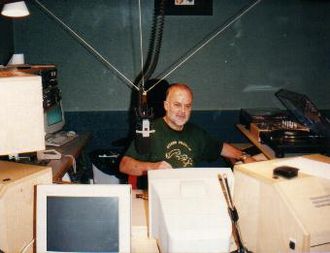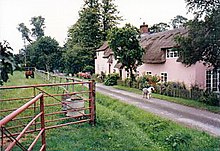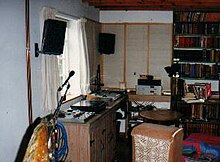John Peel
John Peel , OBE , (born August 30, 1939 in Heswall near Birkenhead , United Kingdom ; † October 25, 2004 in Cuzco , Peru ; real name John Robert Parker Ravenscroft ) was an English radio presenter and DJ . Until his death, Peel was considered one of the most influential experts on pop music .
Life
The beginnings
John Peel was born in the village of Heswall near Liverpool and attended school in Shrewsbury . After completing his military service, he went to the USA in 1962, where he initially worked as a temporary worker for the radio station WRR in Dallas . His northern English accent made him a “Beatles expert” with his own show at a time when British bands were just beginning to hit the USA. He later worked for KOMA in Oklahoma City and for KMEN in San Bernardino, California .
In 1965 he married Shirley Ann Milburn, who was just fifteen (February 16, 1949 - June 20, 1987). The marriage later failed in England.
In the spring of 1967 he returned to England because of some problems with the US authorities and the media unions, where he worked for the pirate station Wonderful Radio London (called Big L ) and hosted the program The Perfumed Garden . During this time he took the pseudonym John Peel. When the pirate stations were banned in August 1967, Peel was signed by the BBC and began working for the newly formed pop broadcaster BBC Radio 1 .
In 1968 Peel met his later second wife Sheila.
In 1969, Peel formed Dandelion Records to release Bridget St John's debut album . A total of 27 albums by 18 different artists, including Medicine Head and Kevin Coyne, were released on the label in the three years of its existence . On one of his shows, he said he was about to sign Black Sabbath , and he wondered what his life would have been like then.
Radio dj
Peel's broadcast on the BBC was first called Top Gear (later: John Peel ) and reflected his own taste from the start. In the years that followed, he was the first to spread the music movements punk , reggae and hip-hop over radio frequencies. In the late 1970s, The Fall became his favorite band, to which he remained loyal until his death. In later years his broadcast was often broadcast from his country house in Suffolk , where he had set up a studio. This meant that you could occasionally hear outside noises, which he always incorporated and commented on in the program.
Despite his forty-plus year radio career, his interest in new, unusual indie rock music never waned. Because it was broadcast on BBC World Service and BFBS , he received tons of demo tapes, records and CDs (often over 200 per week) from all over the world - a lot more than he could even have played. Many bands hoped to be discovered by him and known through broadcasting in his programs.
An important part of Peel's broadcast were the Peel Sessions , for which he invited bands to the studio around 4,000 times in order to record the pieces live in a short time without complex production. Many peel sessions were released on phonogram. The first session played on September 21, 1967, the group Tomorrow , the second session a week later played Pink Floyd . The Fall (32 times) and his favorite German band FSK achieved the highest number of peel sessions . The latter played the last session after his death on November 10, 2004. For the release of selected sessions, Peel founded the independent label Strange Fruit Records in 1986 .
Peel also regularly played old recordings on his show, which made a great contribution to the rediscovery of bands and performers from the 1940s, 1950s and 1960s. The reason was mostly the republication as part of compilations.
He produced exclusive programs for many radio stations, including BBC World Service, VPRO Radio3 in the Netherlands, Hansawelle and Radio Bremen 2 (from 1985), Radio Bremen Vier (from 1987) and later also Radio Eins in Germany, Ö3 (Austria ) and Radio Mafia, Helsinki (Finland).
His broadcasts on BBC Radio 1 could also be heard on the Internet worldwide. Through the broadcasts on BBC World Service, he reached listeners all over the world on normal radio and generated a global fan base.
Since 1998 he has hosted three weekly programs on BBC Radio 1 and the magazine program Home Truths on BBC Radio 4 , which dealt with social issues. Most recently, he stepped down a little professionally, for example from the program produced exclusively for Radio Eins in order to write his memoirs , which were published posthumously in 2005 because his wife completed them.
Death and reactions
John Peel died of a heart attack on October 25, 2004 at the age of 65 while on vacation in Cuzco, Peru . He left behind his second wife Sheila and four children. Peel's all time favorite single was the Undertones' Teenage Kicks . In an interview with the British newspaper The Guardian in 2001, Peel said that on his tombstone next to his name only the line of text "Teenage Dreams, So Hard To Beat" should be from this song. John Peel was buried on November 12, 2004 in Great Finborough, Suffolk . Several thousand people, BBC colleagues and many musicians he sponsored had previously come to the public funeral ceremony in Bury St. Edmunds Cathedral to bid farewell. On December 16, 2004, his work was honored with a six-hour tribute event entitled Keep It Peel , which was broadcast live from the BBC's Maida Vale Studios in London to more than ten affiliated European broadcasters. For Germany, the program was broadcast by Radio Eins .
In 2005, the BBC proclaimed October 13, 2005 to be the first international "John Peel Day" and asked fans all over the world to organize events in his memory. From now on, this day is to be celebrated every second Thursday in October to commemorate Peel's last broadcast on October 14, 2004.
effect
John Peel has promoted many very different bands and styles of music. The artists and bands that owe him a lot include Atari Teenage Riot , Aphex Twin , Bolt Thrower , Marc Bolan , David Bowie , Elastica , Carcass , The Clash , The Cure , The Fall , FSK , Joy Division , Half Man Half Biscuit , Killing Joke , Napalm Death , New Order , New Model Army , Nirvana , Pink Floyd , PJ Harvey , Pulp , Roxy Music , Sex Pistols , Tangerine Dream , The Smiths , The Sugarcubes and Björk , Rod Stewart , T. Rex , U2 , The Undertones , The Velvet Underground , The Wedding Present , The Shins and The White Stripes u. v. a.
Andy Parfitt, head of BBC Radio 1, paid tribute to Peel with the following words: “John's influence has dominated the development of pop music for nearly four decades. His contribution to modern music and music culture is immeasurable. ”Peel's promotion of extreme music in any form established his fame, which continues to this day, especially in the independent music scene.
meaning

John Peel's radio broadcasts featured a rare variety of rock, reggae, heavy metal, folklore, techno and African music. Among other things, they ran on the BBC World Service and were therefore accessible to a global audience. Regional radio stations also took over Peel's broadcasts.
His concept was: “A balance between things that you know people will like and things that you think people will like.” ( A balance between pieces that you know people will like and pieces that you think about that people will like them ). He succeeded time and again in discovering new talents and styles of music and being the first to play them in English and internationally broadcast programs, to make them known and thus to trigger new trends, especially in the independent sector .
In Germany, his program John Peel's Music on BFBS could be received for thirty years on the British soldier broadcaster BFBS Radio 1 in northern and western Germany (especially North Rhine-Westphalia, Lower Saxony, Bremen, Hamburg) and in Berlin, which earned him many fans. At times, John Peel's Music was also broadcast on Radio Bremen 4 and DT64 . These were productions moderated for Germany, but he only spoke English. In Austria, John Peel could be heard monthly on the " Ö3 -Nachtexpress" from 1989 to 1994 . Until his death, Peel produced programs for independent radio stations, e.g. B. for the Freie Sender Kombinat (FSK Hamburg) or for the Freie Radio für Stuttgart; He recorded these programs on MD tapes, which were sent from station to station at times.
Peel's ear for extreme music and his feeling for new groups were considered exceptional and were also valued by colleagues internationally. The BBC left him largely, but not always, free space for this.
Due to the importance of the presenter, the BBC planned to name the new wing for the pop wave Radio 1 after him at the beginning of 2012 , but moved away from it in October 2012 for the time being. Reason: As part of the child abuse scandal by Peel colleague Jimmy Savile , Peel also fell into the twilight posthumously. Among other things, a woman had reported who said she was 15-year-old pregnant by Peel. As a student, Peel, himself a victim of abuse, spoke in interviews on the subject of female groupies in his typical laconic style, saying that he had "never asked the girls for their ID", that is, their age. In November 2013 the building was still known as the “Peel Wing”.
estate
John Peel's extensive music archive, which consists of over 26,000 albums, 40,000 singles and countless CDs, is to be made completely available online in the long term.
Awards
- Melody Maker readers voted him "DJ of the Year" eleven times
- 1993: Sony Broadcaster of the Year
- 1993: New Musical Express - Godlike Genius Award
- 1998: Order of the British Empire (Rank: Officer)
- 2002: Sony Gold Award
- Member of the Radio Academy Hall of Fame
- Honorary Doctorates from Anglia Ruskin University and Sheffield Hallam University
Fonts
- John Peel and Sheila Ravenscroft: John Peel. Memoirs of the world's most influential DJ. Translator: Christoph Hahn. Munich: Rogner & Bernhard, 2006. ISBN 3-8077-1021-3 (original title: Margrave of the Marshes ).
- John Peel: The Olivetti Chronicles . Columns for The Observer , Sounds , The Guardian etc. a., chosen by his wife Sheila and children. Bantam Press 2008. ISBN 978-0-593-06061-2 .
See also
literature
- Michael Heatley: John Peel. A Life in Music . O'Mara Books Ltd, 2004, ISBN 1-84317-157-0 .
- Mick Wall: John Peel . Orion Books Ltd, 2004, ISBN 0-7528-7674-0 .
- Oliver Zöllner : John Peel (1939-2004). Obituary . In: Rundfunk und Geschichte , Vol. 30 (2004), No. 3/4 , pp. 128–129.
Web links
- John Peel Wiki
- John Peel's homepage on the BBC
- Guardian Photo Gallery
- “I just wanted to be a DJ” Detailed biographical interview from August 2004 / Popkontext.de
- YouTube telephone interview with a German radio station during the 1994 World Cup
- John Peel Archive Peel's extensive collection online
- "The most famous DJ in the world" ( Memento from August 31, 2009 in the Internet Archive ) - On the second anniversary of his death, Esther Kogelboom wrote this article for the Berliner Tagesspiegel , October 23, 2006, accessed on June 30, 2019
Individual evidence
- ↑ https://www.independent.co.uk/voices/john-peel-allegations-metoo-radio-1-jimmy-savile-a9097866.html
- ↑ https://books.google.de/books?id=boW_uH5Tt9IC&pg=PT22&lpg=PT22
- ↑ https://books.google.de/books?id=Xq7SDQAAQBAJ&pg=PT276&lpg=PT27
- ↑ Peel Sessions on bbc.co.uk
- ↑ So hard to beat . In: The Guardian , November 2, 2001.
- ^ Sally Peck: John Peel gets Teenage Kicks epitaph . In: The Telegraph , February 13, 2008.
- ↑ Keeping It Peel ( Memento of November 1, 2005 in the Internet Archive ) on bbc.co.uk
- ^ For the record . In: The Observer , October 23, 2005.
- ↑ Legendary radio DJ John Peel this on bbc.co.uk
- ↑ The "Egdon Wing" in Broadcasting House 2012 "Peel Wing" should be called after the new building.
- ↑ Tara Conlan: John Peel tribute could be ditched by BBC . In: The Guardian , October 12, 2012.
- ↑ BBC - The Story of Broadcasting House ( Memento December 5, 2013 in the Internet Archive ) on bbc.co.uk
- ↑ Sean Michaels: John Peel's record collection goes online . In: The Guardian , April 30, 2012, accessed May 2, 2012.
| personal data | |
|---|---|
| SURNAME | Peel, John |
| ALTERNATIVE NAMES | Ravenscroft, John Robert Parker (real name) |
| BRIEF DESCRIPTION | British radio presenter and DJ |
| DATE OF BIRTH | August 30, 1939 |
| PLACE OF BIRTH | Heswall , UK |
| DATE OF DEATH | October 25, 2004 |
| Place of death | Cuzco , Peru |



